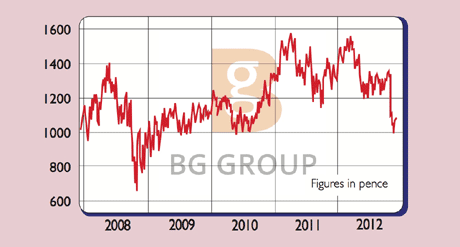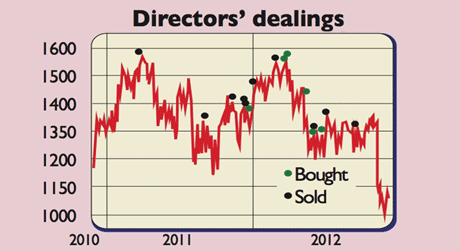Shares in focus: Global gas giant has further to go
City investors have fallen out of love with BG Group. Can the gas giant regain some of its sparkle - and should you buy the shares? Phil Oakley investigates.
Get the latest financial news, insights and expert analysis from our award-winning MoneyWeek team, to help you understand what really matters when it comes to your finances.
You are now subscribed
Your newsletter sign-up was successful
Want to add more newsletters?

Twice daily
MoneyWeek
Get the latest financial news, insights and expert analysis from our award-winning MoneyWeek team, to help you understand what really matters when it comes to your finances.

Four times a week
Look After My Bills
Sign up to our free money-saving newsletter, filled with the latest news and expert advice to help you find the best tips and deals for managing your bills. Start saving today!
Unloved BG is a buy for the long term, says Phil Oakley.
The business
BG is a global gas giant. Its main business activity is exploring for, and producing, natural gas. It owns and operates gas fields in 25 countries across the world. The company also has significant oil reserves in countries such as Brazil and Kazakhstan.
At the moment, BG produces most of its gas and oil in Britain and America, alongside Egypt and Trinidad and Tobago. However, the company is currently spending billions of dollars developing its Brazilian oil fields and gas in Australia. Production from these two countries will form a major part of the business in the years ahead. At the end of 2011, the firm had gas and oil reserves of 17,130 million barrels of oil equivalent.
MoneyWeek
Subscribe to MoneyWeek today and get your first six magazine issues absolutely FREE

Sign up to Money Morning
Don't miss the latest investment and personal finances news, market analysis, plus money-saving tips with our free twice-daily newsletter
Don't miss the latest investment and personal finances news, market analysis, plus money-saving tips with our free twice-daily newsletter
BG is also a major player in the world of liquefied natural gas (LNG). It has operations all across the LNG chain, from turning the gas into liquid, shipping it across the world's oceans, and then turning the liquid back into gas again. It is the biggest supplier of LNG to the growing Chinese economy. BG had trading profits of $7.7bn in 2011.
The history
BG was once part of the British Gas Corporation, which was privatised by the British government in 1986. In 1997 the firm was split in two, with the creation of BG plc and Centrica. In 2001, BG sold off its British gas transmission and distribution business to become a focused gas exploration and production company.
Up until recently, BG was a great success story. Over the last 15 years, it has transformed itself from being a mainly British-focused business into one of the world's most admired gas companies. Unlike companies such as BP and Shell, BG has delivered impressive rates of production and profit growth while at the same time being one of the lowest-cost producers.
Notable successes over the years include the Karachaganak gas field in Kazakhstan (1997), huge oil discoveries in Brazil's Santos Basin (in both 2006 and 2008) and the purchase of Queensland Gas Company (2008). It has also built up an impressive LNG business supplying fast-growing Asian economies.
However, just lately BG has lost some of its shine with investors. Production growth has ground to a halt while there have been some teething troubles getting gas out of places such as Egypt, the North Sea and Tunisia. As BG also spends lots of cash on developing assets in Brazil and Australia, some commentators are concerned that BG's days as a growth company may be over.
The chief executive
Frank Chapman has been chief executive of the company since 2000. He has spent all his working life in the oil and gas industry, having worked for both BP and Shell before joining BG in 1996. Much of BG's success over the last decade has been attributed to him.
He is standing down next year, though, and must be a little bit miffed to be leaving just as the shares have lost their lustre with the City. He should be looking forward to a comfortable retirement, though, having amassed a pension pot of nearly £20m.
Should you buy the shares?
Professional investors and the City can be a fickle lot. A few bits of bad news from BG in recent weeks have seen many of them go cold on the company. City analysts have been busy playing with their spreadsheets and lowering their expectations for profit growth.
Sometimes this obsession with companies always hitting "their numbers" gets a bit tiresome. But it can also be good news for private investors it can give us a good chance to buy into a company when it's temporarily fallen out of favour.
It's true that BG has a few things to sort out right now. It is ploughing piles of cash into projects in Brazil and Australia that aren't giving anything back yet. Production problems at the same time elsewhere have not been helpful. Throw in the fact that no-one knows who's going to be running the company from next year and you can perhaps understand why some investors have taken fright.
But has the long-term outlook really changed that much? Despite the big debates about climate change and the push for renewable energy, wind farms and solar panels are not going to be able to keep the lights on (not alone, certainly). The world is awash with gas, which is a lot cleaner than coal. This is why BG, with its gas reserves and LNG business, still has lots of attractions.
Most of Asia, not to mention Britain, is hungry for gas and they will increasingly buy it in liquid form from the likes of BG. The company is also developing LNG export facilities in the States to take advantage of America's large reserves of shale gas.
In a couple of years' time, BG will be pumping oil from the Santos Basin in Brazil and selling LNG to the Chinese from Australia. It will start growing profits and cash flows again, something that companies such as BP and Shell may struggle to do.
BG has been cleaning itself up by selling power stations and its gas distribution assets, meaning its finances are in good shape. Compared with the world's oil majors (BP trades on a forward price-to-earnings (p/e) ratio of 7.2, while Shell is on a p/e of 8.2), BG shares are no bargain. But the quality of its assets and potential for long-term profit growth means they are worth paying up for after the recent setback.
In years gone by, BG has been touted as a potential takeover target for the likes of Shell or Exxon. If a new chief executive struggles to get the cash flowing again, somebody else might come along and do it for them.
Verdict: Long-term BUY
The numbers

Stockmarket code: BG
Share price: 1,080p
Market cap: £36.7bn
Net assets (September 2012): $31.7bn
Net debt (September 2012): $11.0bn
P/e (current year estimate): 12.6 times
Yield (prospective): 1.5%
Interest cover: 14.1
What the analysts say
Buy: 20
Hold: 10
Sell: 2
Average price target: 1,428p
Directors' shareholdings

F Chapman (CEO): 1,516,447
F Barbosa (FD): 25,808
A Gould (Chairman): 30,000
Get the latest financial news, insights and expert analysis from our award-winning MoneyWeek team, to help you understand what really matters when it comes to your finances.
Phil spent 13 years as an investment analyst for both stockbroking and fund management companies.
-
 Can mining stocks deliver golden gains?
Can mining stocks deliver golden gains?With gold and silver prices having outperformed the stock markets last year, mining stocks can be an effective, if volatile, means of gaining exposure
-
 8 ways the ‘sandwich generation’ can protect wealth
8 ways the ‘sandwich generation’ can protect wealthPeople squeezed between caring for ageing parents and adult children or younger grandchildren – known as the ‘sandwich generation’ – are at risk of neglecting their own financial planning. Here’s how to protect yourself and your loved ones’ wealth.
-
 Somero: trading this overlooked bargain
Somero: trading this overlooked bargainFeatures Mechanical-screed maker Somero dominates its niche and is attractively valued. Matthew Partridge picks the best way to trade it.
-
 How to find big profits in small companies
How to find big profits in small companiesCover Story The small- and micro-cap sectors are risky and volatile. But with careful research and patience, investors could make huge gains. Matthew Partridge explains how to find the market’s top tiddlers.
-
 The hidden gems on Aim, London's junior market
The hidden gems on Aim, London's junior marketFeatures Aim, London’s junior market, is risky – but you can find solid stocks at low prices. Scott Longley reports.
-
Three Aim-listed firms that will thrive in a post-Brexit world
Opinion Matt Tonge and Victoria Stevens of the Liontrust UK Smaller Companies Fund pick three Aim-listed firms that will survive Brexit turmoil.
-
Fetch! The Chinese small-cap stocks to buy in the Year of the Dog
Opinion Each week, a professional investor tells us where she’d put her money. This week: Tiffany Hsiao of Matthews Asia selects three Chinese small-cap stocks with exciting potential.
-
Small and mid-cap stocks with big potential
Opinion Professional investor Guy Anderson of the Mercantile Investment Trust selects three small and medium-sized firms with promising prospects that the market has missed.
-
 Get cheap, reliable growth from smaller companies
Get cheap, reliable growth from smaller companiesFeatures One of the most reliable long-term investment trends is the long-term outperformance of smaller companies over blue chips. Max King picks some of the best ways to buy into this growth.
-
 Now the bitcoin bubble’s burst, what’s the next big thing?
Now the bitcoin bubble’s burst, what’s the next big thing?Features Forget bitcoin, if you want to increase your wealth faster than most other people, you need to find the next big thing. Merryn Somerset Webb suggests some places to look.